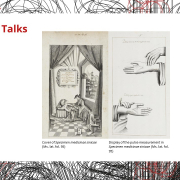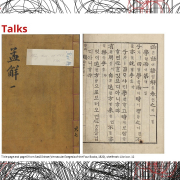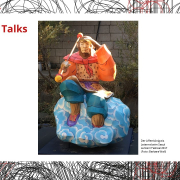(See English below)
Im Rahmen seines Vortrages „Pekingologie und wissenschaftliche China-Expertise in Deutschland nach 1949: Zur Scharnierfunktion des Sinologen Wolfgang Franke (1912–2007)“ am 28. November 2024 ab 18 Uhr wird Herr Stefan Messingschlager (Helmut-Schmidt-Universität/Universität der Bundeswehr Hamburg) Einblicke in die Rolle und Praxis wissenschaftlicher China-Expertise nach 1949 geben. Dabei wird er besonderen Fokus auf den Hamburger Sinologen Wolfgang Franke legen, dem in den Nachkriegsjahrzehnten eine herausragende Bedeutung für die transkulturelle und politische Vermittlung zwischen China und dem „Westen“ zukam. Neben seiner Expertenrolle in Politik und öffentlichem Diskurs hatte Wolfgang Franke auch eine Scharnierfunktion zwischen universitärer Sinologie und außeruniversitärer China-Expertise inne, so der Referent – und förderte so die Etablierung der gegenwartsbezogenen Chinaforschung in der Bundesrepublik.
Mit der Ausrufung der Volksrepublik China im Oktober 1949 wurde das Land für westliche Gesellschaften innerhalb kurzer Zeit zu einer Art Blackbox. In den meisten westlichen Staaten entwickelte sich vor diesem Hintergrund die Praxis der „China-Expertise“ – eine vielfältige, auf den öffentlichen Raum gerichtete Tätigkeit des Deutens, Beratens und Vermittelns, die unterschiedlichste Formen annahm: von der Deutung und Vermittlung im öffentlichen Diskurs über Politikberatung bis hin zur vermittelnden Praxis im transnationalen Austausch in den Bereichen Diplomatie, Wirtschaft und Kultur.
Anders als in den USA war China-Expertise in der Bundesrepublik Deutschland in der Phase des sogenannten „Great Interregnums“ der 1950er bis 1970er Jahre nicht in erster Linie ein wissenschaftliches Projekt, sondern wurde vor allem von „Old-China-Hands“ wie Lily Abegg oder Klaus Mehnert getragen. Trotzdem spielte auch die Wissenschaft von Anfang an eine wichtige Rolle, interessanterweise jedoch gerade nicht die Sinologie, die sich bis weit in die 1970er Jahre vor allem als philologische Disziplin verstand. Stattdessen waren es Politikwissenschaftler wie Gottfried-Karl Kindermann und Jürgen Domes, die prägende Deutungsangebote zur chinesischen Politik entwickelten. Jenseits der universitären Chinaforschung waren es aber vor allem die neu gegründeten Forschungsinstitutionen wie das Institut für Asienkunde (IfA) und die Stiftung Wissenschaft und Politik (SWP), die zu entscheidenden Trägern wissenschaftlicher China-Expertise wurden und ab den 1970er Jahren politikberatende Funktionen übernahmen.
In diesem Kontext avancierte der Sinologe Wolfgang Franke zu einer Schlüsselfigur: Er lieferte mit seinen Schriften nicht nur breit rezipierte Deutungen, wirkte politikberatend und vermittelte in den deutsch-chinesischen Beziehungen. Als wohl renommiertester Lehrstuhlinhaber für Sinologie in Deutschland förderte er auch eine stärkere Gegenwartsorientierung der Sinologie – ein entscheidender Schritt zur Etablierung der gegenwartsbezogenen Chinaforschung in der Bundesrepublik.
Die Vortragssprache ist Deutsch. Bei Fragen kontaktieren Sie uns unter: ostasienabt@sbb.spk-berlin.de.
Der Vortrag wird darüber hinaus via Webex gestreamt und aufgezeichnet*. Sie können am Vortrag über Ihren Browser ohne Installation einer Software teilnehmen. Klicken Sie dazu unten auf „Zum Vortrag“, folgen dem Link „Über Browser teilnehmen“ und geben Ihren Namen ein.
Alle bislang angekündigten Vorträge finden Sie hier. Die weiteren Termine kündigen wir in unserem Blog und auf unserem X-Account an. Weitere Informationen zum Leben und Wirken von Wolfgang Franke finden Sie im vom Vortragenden, Herrn Messingschlager, erstellten CrossAsia Themenportal „Im Banne Chinas“ – Der Sinologe Wolfgang Franke als Forscher Mittler.
—
The lecture ‘Pekingology and scientific China expertise in Germany after 1949: On the hinge function of the sinologist Wolfgang Franke (1912-2007)’ on November 28, 2024 from 6 pm, Mr. Stefan Messingschlager (Helmut-Schmidt-Universität/Universität der Bundeswehr Hamburg) will provide insights into the role and practice of scholarly China expertise after 1949. He will place special focus on the Hamburg Sinologist Wolfgang Franke, who played a pivotal role in the postwar decades in facilitating transcultural and political mediation between China and the “West”. In addition to his role as an expert in politics and public discourse, Wolfgang Franke also served as a bridge between Sinology and China expertise outside academia, thereby advancing the establishment of contemporary China studies in the Federal Republic of Germany.
With the proclamation of the People’s Republic of China in October 1949, the country quickly became a kind of black box for Western societies. In most Western states, the practice of “China expertise” developed in response – a multifaceted practice aimed at the public sphere that involved interpreting, advising, and mediating, taking various forms: from interpretation and mediation in public discourse to policy advising and intermediary practices in the transnational exchange of diplomacy, economics, and culture.
Unlike in the United States, China expertise in the Federal Republic of Germany during the so-called “Great Interregnum” of the 1950s to the 1970s was not primarily an academic endeavor but was largely shaped by „Old China Hands“ such as Lily Abegg and Klaus Mehnert. However, from the outset, academia also played a role, though interestingly not through Sinology, which until well into the 1970s primarily understood itself as a philological discipline. Instead, political scientists like Gottfried-Karl Kindermann and Jürgen Domes developed important interpretative frameworks for Chinese politics. Beyond China research in academia, it was particularly the newly founded research institutions, such as the Institute of Asian Studies (IfA) and the German Institute for International and Security Affairs (SWP), that became key contributors to scholarly China expertise and, from the early 1970s onward, increasingly assumed advisory roles in policy matters.
In this context, Sinologist Wolfgang Franke became a key figure: not only did he contribute significant interpretations of China through his writings, but he also engaged in policy advising and facilitated Sino-German relations. As perhaps the most renowned Sinology chairholder in Germany, he also promoted a stronger contemporary focus within Sinology – a crucial step in establishing contemporary China studies in the Federal Republic of Germany.
The lecture will be held in German. If you have any questions, please contact us: ostasienabt@sbb.spk-berlin.de.
The lecture will also be streamed and recorded via Webex*. You can take part in the lecture using your browser without having to install a special software. Please click on the respective button “To the lecture” below, follow the link “join via browser” (“über Browser teilnehmen”), and enter your name.
You can find all previously announced lectures here. We will announce further dates in our blog and on X. Further information on the life and work of Wolfgang Franke can be found in the CrossAsia thematic portal ‘Im Banne Chinas’ – Der Sinologe Wolfgang Franke als Forscher Mittler, created by the lecturer Mr. Messingschlager.
*Mit Ihrer Teilnahme an der Veranstaltung räumen Sie der Stiftung Preußischer Kulturbesitz und ihren nachgeordneten Einrichtungen kostenlos alle Nutzungsrechte an den Bildern/Videos ein, die während der Veranstaltung von Ihnen angefertigt wurden. Dies schließt auch die kommerzielle Nutzung ein. Diese Einverständniserklärung gilt räumlich und zeitlich unbeschränkt und für die Nutzung in allen Medien, sowohl für analoge als auch für digitale Verwendungen. Sie umfasst auch die Bildbearbeitung sowie die Verwendung der Bilder für Montagen. / By participating, you grant the Stiftung Preußischer Kulturbesitz and its subordinate institutions free of charge all rights of usage of pictures and videos taken of you during this lecture presentation. This declaration of consent is valid in terms of time and space without restrictions and for usage in all media, including analogue and digital usage. It includes image processing and the usage of photos in composite illustrations. German law will apply.

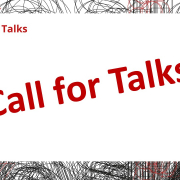
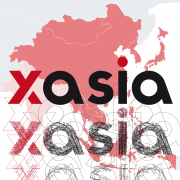
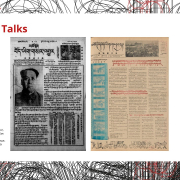
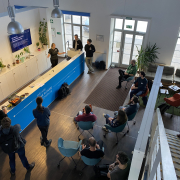 Cloud & Heat
Cloud & Heat
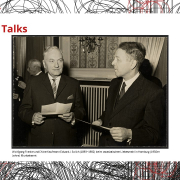
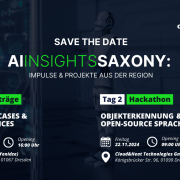 Cloud&Heat
Cloud&Heat